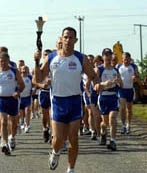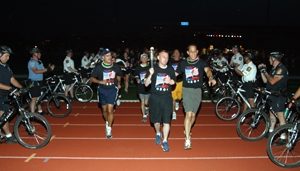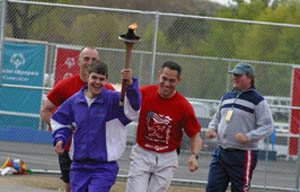 |
Detective Luis Rosa’s involvement with Special Olympics Connecticut sprung from a combination of chance, circumstance, and empathy. Serving as a detective with the FBI Joint Terrorism Task Force and the director for Special Olympics Connecticut’s Law Enforcement Torch Run, Rosa takes on the monumental tasks of maintaining public safety and ensuring that Special Olympics athletes all over Connecticut have the opportunity to develop through organized sports. And it is just one of the reasons why, when asked about heroes, Special Olympics Connecticut staff members are quick to name Detective Rosa. Beau Doherty, Special Olympics Connecticut president, believes that, “Luis Rosa is a hero because he volunteers to make the lives of people with disabilities better, while balancing a demanding job with law enforcement.”
Sixteen years ago, Luis was just one of the law enforcement officers pitching in by running a leg in the Special Olympics Law Enforcement Torch Run; but on the last day of the event, Luis’ cousin, a Torch Run leg coordinator, roped him into an extra run—the final leg, which leads into the track and field stadium and kicks off the opening ceremony. As Rosa entered the stadium, where the torch is handed off to an athlete to light the cauldron, his eyes opened to a new world. “When I ran into the stadium, I looked at all the athletes and saw the place packed (with people) and that’s how I got hooked…I saw the athletes and how thrilled they were to see us, and their family members who were saying things like, ‘thank you for doing what you do to make a difference for my child to be able to compete in sporting events.’ I thought, ‘Whoa, I need to get involved more’.” So Detective Rosa went on to investigate all that Special Olympics encompasses. “That’s when I started to learn that this is not just a torch run three-day event, it’s a year round event,” said Rosa.
 |
The mission of Special Olympics is to provide persons with intellectual disabilities the opportunity to develop through organized sports, and the Law Enforcement Torch Run is one of the major ways in which this opportunity is secured for nearly two million athletes around the world. The history of the Torch Run starts in 1981, in Wichita, Kansas, when the Wichita police chief saw the urgent need to raise funds for Special Olympics. The run soon spread throughout the United States and internationally. When Skip Thomas, the current Homeland Security Director for the state of Connecticut, was the chief of police in Vernon, CT, he attended an international conference for the Law Enforcement Torch Run. He came back ready to get the Run started in his home state. The first Torch Run for the Connecticut Special Olympics took place in the summer of 1986. It covered 120 miles in five days, and raised nearly $40,000.
The torch run now runs for three days, involves 3,000 runners, all connected to law enforcement agencies, 120-plus police departments, and raises nearly a half-million dollars. For each of the three days, there are two runs that merge together for a big rally at the end of the day. On the last day, the runners meet in the stadium.
 |
While the run only lasts for three days every June to mark the beginning of the Summer Special Olympics, the fundraising and public relations never end. The more officers involved, the more awareness it brings to the community at large. “We look at the torch run as an instrument to spread the word (about Special Olympics).” Although honored to be appointed director by board members Beau Doherty and Bob Garguilio, and former director Ray Wiederhold, Rosa is also quick to point out the team effort involved in the success of this project. “It’s not about me. It’s about us as a group.”
The time and effort that this group of volunteers puts into Special Olympics is enormous. But what they get back is even grander. “It’s a challenge but it is worth it…when we see the athletes smiling at us, that’s enough. That’s our reward.” Rosa continues, “It is that deep warm feeling that we receive when we (the Law Enforcement Torch Runners) see the joy we bring to the athlete, family and friends…the athletes train and compete in all types of sports, along with building relationships with other athletes, volunteers, and supports. Building a friendship, and sharing a feeling, is so rewarding.” One of the unique rewards comes in the form of exemplary sportsmanship. At one track and field meet, one of the runners fell down and all the other athletes stopped running. They waited for the runner to get up and allowed him to be the winner. As Rosa notes, “It’s not all about winning; it’s about being able to compete.”
While they may not coach or train, the officers who volunteer have plenty of opportunities to form friendships with the athletes through the opening and award ceremonies, the games themselves, and other year-round fundraising events. Every year, athletes and their families eagerly await the awards ceremony, where the officers present medals to the athletes. In fact, they ask for the officers, just to make sure that they will be there. The officers, in turn, have the thrill of seeing the positive impact that their fundraising—and their presence—has on thousands of families. From golf tournaments to polar plunges, those volunteering with the Torch Run are working at all times to ensure that there will always be enough funds to provide athletes with the chance to compete. The Law Enforcement Torch Run is the highest grassroots fundraising community for the Special Olympics. “Without us,” Rosa says, “they can’t compete.”
 |
The continual challenges of running a huge part of Special Olympics fundraising can bring on enough stress to make the position of Torch Run Director a curse more than an honor, but Rosa keeps going. He’s growing the number of towns and police departments involved to increase awareness throughout the state, and he’s using the web and email to keep the officers more involved throughout the year. Anytime the Special Olympics office in Hamden needs Rosa, he’s there. When it comes down to the reason why Rosa spends so much of his time working on Special Olympics the answer is simple: “I enjoy doing it. It’s my stress reliever. This is my way of getting away from work, but still giving back to people in the communities.”
Even the biggest and toughest of officers get teary eyed as they watch an athlete light the cauldron. As it did with Rosa, the moment comes when their interest is sparked. They are ready to be a part of the love and commitment that the law enforcement team has for the Special Olympics. These officers who, by profession, have chosen to be the ones to solve problems while others run to safety, don’t easily admit to being heroes; however, one glance at the athletes as the cauldron is lit or as they receive their medals from the officers, will tell you that they are some of Connecticut’s biggest heroes. Luis hopes that other officers will see the joy and the happiness that they can help bring to the community and decide to be a hero, too.
 |
If interested in learning more about the ways in which you can help, please log on to www.soct.org or the Special Olympics main site, www.specialolympics.org, or contact your local law enforcement department.
Page created on 8/1/2014 4:13:09 PM
Last edited 1/7/2020 3:49:31 PM
